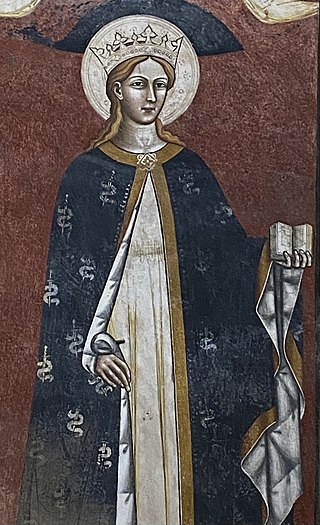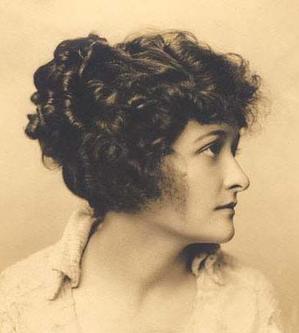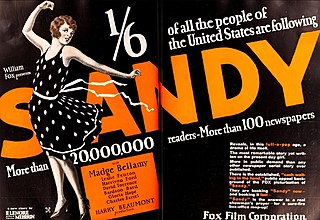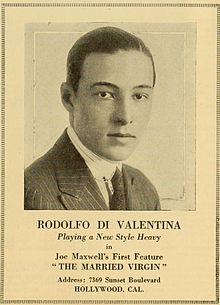
Rodolfo Pietro Filiberto Raffaello Guglielmi di Valentina d'Antonguella, known professionally as Rudolph Valentino and nicknamed The Latin Lover, was an Italian actor who starred in several well-known silent films including The Four Horsemen of the Apocalypse, The Sheik, Blood and Sand, The Eagle, and The Son of the Sheik.

Theodora Goes Wild is a 1936 American screwball comedy film that tells the story of the residents in a small town who are incensed by a risqué novel, unaware that the book was written under a pseudonym by a member of the town's leading family. It stars Irene Dunne and Melvyn Douglas and was directed by Richard Boleslawski. The film was written by Mary McCarthy and Sidney Buchman. Dunne was nominated for an Academy Award as Best Actress in a Leading Role and the movie was also nominated for the Best Film Editing.
Cristina Bazán is the name of a 1978 and 2016, Puerto Rican telenovela starring Puerto Rican actress and singer Johanna Rosaly, and the Venezuelan singer/idol José Luis Rodríguez El Puma. The soap opera, was co-produced in Puerto Rico by Radio Caracas Television of Venezuela and Telemundo Puerto Rico. The show had international success and a record numbers of viewers.

Ethel Kennedy was an American human rights advocate. She was the wife of U.S. senator Robert F. Kennedy, a sister-in-law of U.S. president John F. Kennedy, and a daughter of businessman George Skakel.

Mary of Enghien, also known as Maria d'Enghien, was ruling Countess of Lecce from 1384 to 1446 and Queen of Naples and titular Queen of Sicily, Jerusalem and Hungary from 1406 to 1414 by marriage to Ladislaus of Naples.
Catherine of Taranto was the daughter of Mary of Enghien and Raimondo Orsini del Balzo di Nola and sister of Giovanni Antonio Orsini del Balzo.

Natalia Ginzburg was an Italian author whose work explored family relationships, politics during and after the Fascist years and World War II, and philosophy. She wrote novels, short stories and essays, for which she received the Strega Prize and Bagutta Prize. Most of her works were also translated into English and published in the United Kingdom and the United States.

Mary Loretta Philbin was an American film actress of the silent film era, who played Christine Daaé in the 1925 film The Phantom of the Opera opposite Lon Chaney, and Dea in The Man Who Laughs alongside Conrad Veidt.

The Delicious Little Devil is a 1919 American silent comedy-drama film starring Mae Murray and Rudolph Valentino. A 35 mm print of the film is housed at the EYE Film Instituut Nederland, Nederlands Filmmuseum.

Jane Novak was an American actress of the silent film era.

He Married His Wife is a 1940 film about a race horse owner who wants his ex-wife to remarry so he'll no longer have to pay alimony. This movie is a black-and-white comedy released January 19 1940, directed by Roy Del Ruth and written by John O'Hara, among others.

Kathleen Kirkham Woodruff was an American actress on stage and in silent films.

Vera Sisson was an American actress of the silent era.

Mi pecado is a Mexican telenovela that was produced by Televisa and aired on Canal de las Estrellas from Monday, June 15, 2009, through Friday, November 13, 2009. It stars Maite Perroni, Eugenio Siller, Francisco Gattorno, Daniela Castro, Sergio Goyri, Sabine Moussier, Jessica Coch, Altaír Jarabo, and Armando Araiza.

Valentino is a 1951 American biographical film directed by Lewis Allen and starring Anthony Dexter and Eleanor Parker.

The Homebreaker is a 1919 American silent comedy film directed by Victor Schertzinger and written by John Lynch and R. Cecil Smith. The film stars Dorothy Dalton, Douglas MacLean, Edwin Stevens, Frank Leigh, Beverly Travis, and Nora Johnson. The film was released on April 20, 1919 by Paramount Pictures. It is presumed to be a lost film.

A City Sparrow is a 1920 American silent drama film directed by Sam Wood and written by Kate Jordan and Clara Genevieve Kennedy. The film stars Ethel Clayton, Walter Hiers, Clyde Fillmore, Lillian Leighton, William Boyd, and Rose Cade. The film was released on October 17, 1920, by Paramount Pictures.

Elena Russo is an Italian actress of cinema, television and theatre.

Salón México is a 1949 Mexican film noir directed by Emilio Fernández and written jointly by Fernandez and Mauricio Magdaleno. It stars Marga López as a dance hall prostitute struggling to support her younger sister at an exclusive upscale school. It earned Lopez the 1950 Ariel Award for Best Actress and a nomination for the Ariel Award for Best Supporting Actor for Rodolfo Acosta.

Sandy is a 1926 American silent drama film directed by Harry Beaumont and starring Madge Bellamy, Leslie Fenton, and Harrison Ford.



















